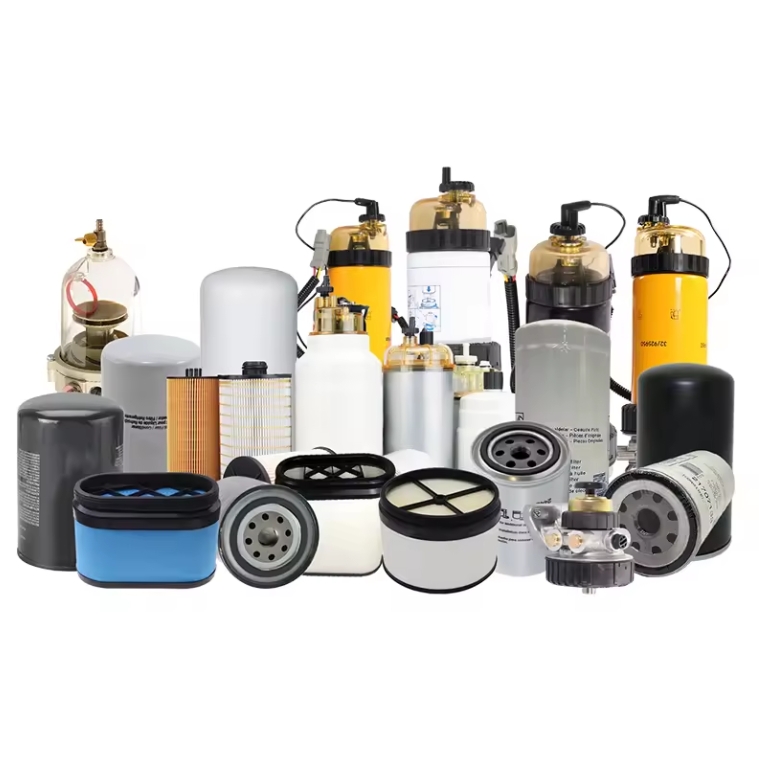
Maintaining truck filters is a small but crucial task that can significantly impact the lifespan and efficiency of a fleet. I’ve seen firsthand how neglected filters can lead to costly breakdowns and reduced fuel efficiency. If you're managing a fleet or even just a single truck, knowing when and how to replace your filters can save you from a world of trouble.
Truck filters protect your engine from contaminants that can cause damage and reduce performance. But filters don’t last forever. Understanding their replacement cycles will help you keep your trucks running efficiently and prevent costly engine failures.
So, how do you know when to replace each type of truck filter? Let’s break it down.
How do I know when my truck filter needs to be replaced?
Each type of filter has a different lifespan, but there are some common warning signs that indicate it’s time for a replacement.
Look for these signs:
- Decreased fuel efficiency1: A clogged filter forces the engine to work harder, consuming more fuel.
- Loss of engine power2: If your truck feels sluggish or has trouble accelerating, the filter might be restricting airflow or fuel flow.
- Check engine light3: Many modern trucks have sensors that trigger a warning when a filter is clogged.
- Unusual noises or rough idling: A struggling filter can disrupt airflow or fuel delivery, causing the engine to run rough.
| Filter Type | Signs of Needed Replacement |
|---|---|
| Air Filter | Reduced acceleration, black smoke from the exhaust, increased fuel consumption. |
| Oil Filter | Dirty or sludgy oil, engine overheating, reduced oil pressure. |
| Fuel Filter | Hard starts, misfires, reduced fuel efficiency, poor engine performance. |

Tip: If your truck operates in harsh conditions—dusty roads, extreme temperatures, or frequent stop-and-go traffic—you’ll need to replace filters more frequently.
How to pick a high-quality replacement truck filter?
Replacing filters isn’t just about frequency—it’s also about quality. A cheap, poorly made filter can cause just as much damage as an old, clogged one.
What should you look for in a high-quality filter?
- Durability: Look for filters made from high-quality materials like synthetic fibers or pleated paper.
- Compatibility: Always check that the filter matches your truck’s make and model.
- Certifications: Choose filters that meet OEM (Original Equipment Manufacturer) standards or international quality certifications.
| Feature | Why It Matters |
|---|---|
| Material Quality | Durable materials ensure the filter lasts longer and performs better. |
| Filtration Efficiency | Higher efficiency means fewer contaminants reach your engine. |
| Fit & Seal | A perfect fit prevents leaks and ensures proper function. |

Pro tip: A bad filter won’t just reduce performance—it can also void your truck’s warranty. Always choose filters that meet the manufacturer’s specifications.
How long do air filters last in trucks?
Air filters are crucial for keeping dust, dirt, and debris from entering the engine. A clogged air filter can reduce fuel efficiency and lower engine power.
Typical lifespan of truck air filters:
- Standard conditions: 15,000 – 30,000 miles
- Dusty/off-road conditions: 10,000 miles or less
| Condition | Air Filter Lifespan |
|---|---|
| Highway driving | 20,000 – 30,000 miles |
| Urban driving | 15,000 – 20,000 miles |
| Dusty/off-road | 10,000 miles or less |

Key signs you need a replacement:
- The filter looks dirty or clogged.
- Your truck’s fuel economy is worsening.
- You notice black smoke from the exhaust.
- The engine struggles to accelerate.
How long do oil filters last in trucks?
The oil filter keeps contaminants out of the engine oil, preventing sludge buildup and ensuring smooth operation. An old or clogged oil filter can reduce oil pressure and increase engine wear.
Typical oil filter lifespan:
- Every oil change: Usually 10,000 – 15,000 miles
- Heavy-duty use: Some trucks may require replacement every 7,500 miles
| Oil Type | Oil Filter Lifespan |
|---|---|
| Conventional oil | 5,000 – 7,500 miles |
| Synthetic oil | 10,000 – 15,000 miles |
| Heavy-duty trucks | 7,500 miles or sooner |

What happens if you don’t change your oil filter?
- The filter can clog, reducing oil flow to the engine.
- Sludge buildup can cause overheating and reduce engine efficiency.
- Your engine may wear out faster, leading to expensive repairs.
Always replace the oil filter with every oil change to keep your truck running smoothly.
How long do fuel filters last in trucks?
Fuel filters keep dirt, rust, and debris out of the fuel system. A clogged fuel filter can lead to poor engine performance, hard starts, and misfires.
Typical fuel filter lifespan:
- Standard diesel trucks: 20,000 – 40,000 miles
- Trucks in harsh conditions: 15,000 miles or sooner
| Driving Condition | Fuel Filter Lifespan |
|---|---|
| Highway driving | 30,000 – 40,000 miles |
| Urban driving | 20,000 – 30,000 miles |
| Dirty fuel/harsh conditions | 15,000 miles or less |
Warning signs of a clogged fuel filter:
- Engine struggles to start.
- Loss of power when accelerating.
- Poor fuel efficiency.
- Engine misfires or stalls.
Regular fuel filter changes help maintain peak engine performance and avoid costly fuel system repairs.

Conclusion
Staying on top of your truck’s filter maintenance is one of the easiest ways to prevent breakdowns, improve fuel efficiency, and extend engine life.
Quick filter replacement guide:
- Air filters: Every 15,000 – 30,000 miles (more often in dusty conditions).
- Oil filters: With every oil change (typically 10,000 – 15,000 miles).
- Fuel filters: Every 20,000 – 40,000 miles, depending on conditions.
By keeping your filters fresh, you’re ensuring your fleet runs efficiently, reliably, and cost-effectively.
At Newsure, we specialize in providing high-quality truck filters that meet OEM standards. If you need durable, efficient, and affordable filters, check out our selection at newsuretruckparts.com.
Keep your trucks running at peak performance—one filter at a time.
-
Understanding decreased fuel efficiency can help you identify issues early and save on fuel costs. ↩
-
Exploring the causes of engine power loss can help you troubleshoot and maintain your vehicle effectively. ↩
-
Learning about the check engine light can prevent costly repairs and ensure your truck runs smoothly. ↩




